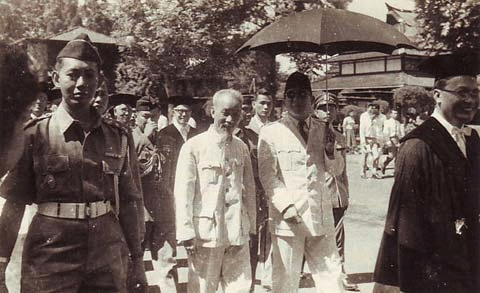
President Ho Chi Minh visited Indonesia in 1959.
Thirty years ago, the 24th General Conference of the United Nations Educational, Scientific and Cultural Organisation adopted Resolution 24C/18.65 naming Uncle Ho as “a Vietnamese hero of national liberation and a great man of culture”, highlighting his thought being embodiment for nations’ aspiration and helping increase mutual understanding and links among nations.
In April 1922, Nguyen Ai Quoc founded the newspaper Le Paria to build "a common voice of the colonial peoples".
The system of French Government was extremely afraid, because in the articles, Nguyen Ai Quoc skillfully promoted mutual understanding and connection by a common view in condemning colonialism.
When Vietnam gained its independence, Uncle Ho took an active part in expanding international relations.
In 1945-1946, Uncle Ho sent 8 letters and telegrams to President Harry Truman; and 3 letters and telegrams to Secretary of State James Byrnes.
In these letters, he always found the common point between the two countries. The US combated the British colonialist to gain independence, while Vietnam did not resign to the colonial domination of the French colonialist. Moreover, both countries sided with the Allies against the Nazis; and the two countries shared a dream of prosperous countries.
Even with his opponent, General Leclerc, the head of the French military force, Uncle Ho also cleverly pointed out the similarities, that he wholeheartedly hoped that the whole of France and Vietnam set forth a bright global mirror by uniting and understanding each other, bringing happiness for both peoples.
When he was forced to carry out the resistance war against France, he still tried to find a common voice for the prosperity of each people. He declared that Vietnam had many resources, and it welcomed French capital and capitalist countries to cooperate honestly with the country.
After 1954, in addition to strengthening relations with socialist countries, he directed the expansion of economic and people-to-people diplomacy to take advantage of the support and consensus of the democratic forces around the world.
He confirmed that Vietnam needed many tools, machines and goods from countries, including capitalist countries; and Vietnam could provide those countries with food and minerals./.
Compiled by BTA